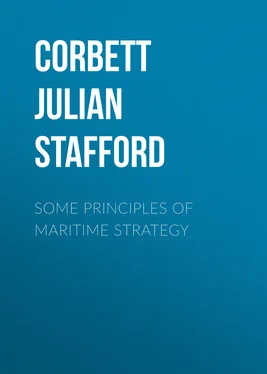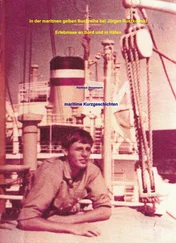Julian Corbett - Some Principles of Maritime Strategy
Здесь есть возможность читать онлайн «Julian Corbett - Some Principles of Maritime Strategy» — ознакомительный отрывок электронной книги совершенно бесплатно, а после прочтения отрывка купить полную версию. В некоторых случаях можно слушать аудио, скачать через торрент в формате fb2 и присутствует краткое содержание. Жанр: military_special, Прочая научная литература, История, foreign_edu, на английском языке. Описание произведения, (предисловие) а так же отзывы посетителей доступны на портале библиотеки ЛибКат.
- Название:Some Principles of Maritime Strategy
- Автор:
- Жанр:
- Год:неизвестен
- ISBN:нет данных
- Рейтинг книги:5 / 5. Голосов: 1
-
Избранное:Добавить в избранное
- Отзывы:
-
Ваша оценка:
- 100
- 1
- 2
- 3
- 4
- 5
Some Principles of Maritime Strategy: краткое содержание, описание и аннотация
Предлагаем к чтению аннотацию, описание, краткое содержание или предисловие (зависит от того, что написал сам автор книги «Some Principles of Maritime Strategy»). Если вы не нашли необходимую информацию о книге — напишите в комментариях, мы постараемся отыскать её.
Some Principles of Maritime Strategy — читать онлайн ознакомительный отрывок
Ниже представлен текст книги, разбитый по страницам. Система сохранения места последней прочитанной страницы, позволяет с удобством читать онлайн бесплатно книгу «Some Principles of Maritime Strategy», без необходимости каждый раз заново искать на чём Вы остановились. Поставьте закладку, и сможете в любой момент перейти на страницу, на которой закончили чтение.
Интервал:
Закладка:
But on land also there are communications of a kind which are essential to national life—the internal communications which connect the points of distribution. Here again we touch an analogy between the two kinds of war. Land warfare, as the most devoted adherents of the modern view admit, cannot attain its end by military victories alone. The destruction of your enemy's forces will not avail for certain unless you have in reserve sufficient force to complete the occupation of his inland communications and principal points of distribution. This power is the real fruit of victory, the power to strangle the whole national life. It is not until this is done that a high-spirited nation, whose whole heart is in the war, will consent to make peace and do your will. It is precisely in the same way that the command of the sea works towards peace, though of course in a far less coercive manner, against a continental State. By occupying her maritime communications and closing the points of distribution in which they terminate we destroy the national life afloat, and thereby check the vitality of that life ashore so far as the one is dependent on the other. Thus we see that so long as we retain the power and right to stop maritime communications, the analogy between command of the sea and the conquest of territory is in this aspect very close. And the analogy is of the utmost practical importance, for on it turns the most burning question of maritime war, which it will be well to deal with in this place.
It is obvious that if the object and end of naval warfare is the control of communications it must carry with it the right to forbid, if we can, the passage of both public and private property upon the sea. Now the only means we have of enforcing such control of commercial communications at sea is in the last resort the capture or destruction of sea-borne property. Such capture or destruction is the penalty which we impose upon our enemy for attempting to use the communications of which he does not hold the control. In the language of jurisprudence, it is the ultimate sanction of the interdict which we are seeking to enforce. The current term "Commerce destruction" is not in fact a logical expression of the strategical idea. To make the position clear we should say "Commerce prevention."
The methods of this "Commerce prevention" have no more connection with the old and barbarous idea of plunder and reprisal than orderly requisitions ashore have with the old idea of plunder and ravaging. No form of war indeed causes so little human suffering as the capture of property at sea. It is more akin to process of law, such as distress for rent, or execution of judgment, or arrest of a ship, than to a military operation. Once, it is true, it was not so. In the days of privateers it was accompanied too often, and particularly in the Mediterranean and the West Indies, with lamentable cruelty and lawlessness, and the existence of such abuses was the real reason for the general agreement to the Declaration of Paris by which privateering was abolished.
But it was not the only reason. The idea of privateering was a survival of a primitive and unscientific conception of war, which was governed mainly by a general notion of doing your enemy as much damage as possible and making reprisal for wrongs he had done you. To the same class of ideas belonged the practice of plunder and ravaging ashore. But neither of these methods of war was abolished for humanitarian reasons. They disappeared indeed as a general practice before the world had begun to talk of humanity. They were abolished because war became more scientific. The right to plunder and ravage was not denied. But plunder was found to demoralise your troops and unfit them for fighting, and ravaging proved to be a less powerful means of coercing your enemy than exploiting the occupied country by means of regular requisitions for the supply of your own army and the increase of its offensive range. In short, the reform arose from a desire to husband your enemy's resources for your own use instead of wantonly wasting them.
Конец ознакомительного фрагмента.
Текст предоставлен ООО «ЛитРес».
Прочитайте эту книгу целиком, на ЛитРес.
Безопасно оплатить книгу можно банковской картой Visa, MasterCard, Maestro, со счета мобильного телефона, с платежного терминала, в салоне МТС или Связной, через PayPal, WebMoney, Яндекс.Деньги, QIWI Кошелек, бонусными картами или другим удобным Вам способом.
1
Clausewitz, On War , p. ix. The references are to Colonel Graham's translation of the third German edition, but his wording is not always followed exactly.
2
Clausewitz, On War, Book viii, chap, ii
3
Ibid, Preparatory Notice, p. vii.
4
Ibid, p. viii
5
Wellington's view of the essential factor was expressed to Rear Admiral Martin, who was sent to Spain by the Admiralty to confer with him in September 1813. "If anyone," he said, "wishes to know the history of this war, I will tell them it is our maritime superiority gives me the power of maintaining my army while the enemy are unable to do so." ( Letters of Sir T. Byam Martin ) [Navy Records Society], ii, p. 499.
6
Correspondance de Napoléon , xix, 421, 4 September.
7
Development of Strategical Science.
8
The strategical object with which the Baltic fleet was sent was certainly to prevent a counter-stroke—that is, its main function in our war plan was negative. Its positive function was minor and diversionary only. It also had a political object as a demonstration to further our efforts to form a Baltic coalition against Russia, which entirely failed. Public opinion mistaking the whole situation expected direct positive results from this fleet, even the capture of St. Petersburg. Such an operation would have converted the war from a limited one to an unlimited one. It would have meant the "overthrow of the enemy," a task quite beyond the strength of the allies without the assistance of the Baltic Powers, and even so their assistance would not have justified changing the nature of the war, unless both Sweden and Russia had been ready to make unlimited war and nothing was further from their intention.
Интервал:
Закладка:
Похожие книги на «Some Principles of Maritime Strategy»
Представляем Вашему вниманию похожие книги на «Some Principles of Maritime Strategy» списком для выбора. Мы отобрали схожую по названию и смыслу литературу в надежде предоставить читателям больше вариантов отыскать новые, интересные, ещё непрочитанные произведения.
Обсуждение, отзывы о книге «Some Principles of Maritime Strategy» и просто собственные мнения читателей. Оставьте ваши комментарии, напишите, что Вы думаете о произведении, его смысле или главных героях. Укажите что конкретно понравилось, а что нет, и почему Вы так считаете.












